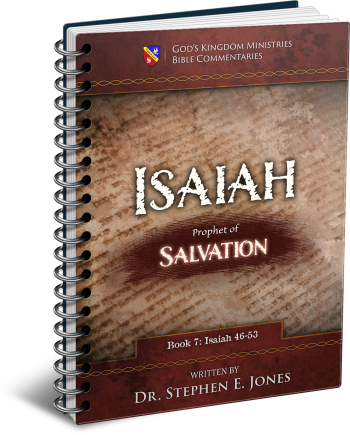Latest Posts
View the latest posts in an easy-to-read list format, with filtering options.

Isaiah is the prophet of Salvation. He is also known as the truly "Universalist" prophet, by which is meant that He makes it clear that salvation is extended equally to all nations and not just to Israel. He lived to see the fall of Israel and the deportation of the Israelites to Assyria, and he prophesied of their "return" to God (through repentance). He is truly a "major prophet" whose prophecies greatly influenced the Apostle Paul in the New Testament.
Category - Bible Commentaries

God continued to speak to the Messiah in Isaiah 49:3, saying,
3 He said to Me, “You are My Servant, Israel, in whom I will show My glory.”
By calling the Messiah Israel, some have thought that Israel was the Messiah. This view is held by some Jews today who think that the present Israeli state is the Messiah. However, when we see that Israel is a title given to those worthy of its testimony, rather than a racial or even national designation, the meaning is clear.
Jacob was not born an Israelite. He was given that name/title when he finally understood the sovereignty of God. He was then worthy of the name. His new name Israel testified that he finally knew that “God rules.” This must be contrasted with his life as Jacob, where he thought God needed his help to fulfill His promises.
Jesus was the promised Messiah, and from the beginning He understood what it meant to be called Israel. That is why He always deferred to His heavenly Father, doing nothing except what He saw His Father do, and speaking nothing except what He heard His Father say. By His example, an Israelite is defined as one who exercises authority properly, knowing that all authority is under God. Authority thus subjects itself to the One who gave it.
In the end, Christ will subject all of creation to the Father, and “the Son Himself also will be subjected to the One who subjected all things to Him, so that God may be all in all” (1 Cor. 15:28). The Messiah was entrusted with creation precisely because the Father knew that He would not usurp sovereignty for Himself, as all other governments have done.
When God says He will show His glory in Israel, it begins with the Messiah and spreads from there to the remnant of grace who will be the first to be glorified as a body. In John 17:5 Jesus prayed,
5 Now, Father, glorify Me together with Yourself with the glory which I had with You before the world was.
But it did not end there, for John 17:22, 23 continues,
22 The glory which You have given Me I have given to them, that they may be one, just as We are one; 23 I in them and You in Me, that they may be perfected in unity, so that the world may know that You sent Me and loved them, even as You have loved Me.
The Father is glorified in Christ; Christ is glorified in His body. The platform of glory is unity. Jesus’s will was in unity with His heavenly Father’s will, for He said, “I and the Father are one” (John 10:30). This was Jesus’ expression of agreement with the Father’s will and plan. When the believers (Jacobs) in the world grow to spiritual maturity and are in full agreement with Christ, then they too will become glorified Israelites in whom Christ is glorified.
Ultimately, the glory of the Lord will cover the earth “as the waters cover the sea” (Isaiah 11:9). Since the waters cover the sea about 100 percent, we know that His glory will cover 100 percent of the earth. But this will be fulfilled in stages, not all at once.
First Christ received glory; then the overcoming remnant of grace at the start of the Tabernacles Age; then a thousand years later the rest of the church will be glorified with immortality; and finally, at the Creation Jubilee, the rest of creation will be set free into the liberty and glory of the children of God (Rom. 8:21).
This is the long-term plan of God’s glory that is to cover the entire earth. It takes a long time to bring full unity between heaven and earth, where the two come fully into agreement. This is the great cosmic marriage promised in Scripture and described in Gen. 2:24, “and they shall become one flesh.”
Meanwhile, however, the glory of God appeared to be elusive throughout history. Because it was to take such a long time, men were often discouraged when they saw how impossible it was for them to attain unity by the power of their own will.
Isaiah 49:4 says,
4 But I said, “I have toiled in vain, I have spent My strength for nothing and vanity; yet surely [aken] the justice [mishpat, “the act of deciding a case”] due to Me is with the Lord, and My reward with My God.”
The NASB translation (above) makes it appear that Christ Himself was complaining. But Jesus never expressed such thoughts. He never thought that He “toiled in vain.” This is rather a picture of the exiled Israelites who were yet carnal and who were still laboring under the Old Covenant to deliver themselves from captivity and to perfect themselves by their own works.
In other words, this is the voice of Jacob, not Israel. This is the voice of Old Covenant people who are required by their own vow to obtain salvation through the power of their own will. In fact, the Old Covenant was not designed to succeed but to fail. It was designed to bring all men to the conclusion that it does not work, so that they may seek another solution—the New Covenant—where God Himself vows to perfect us by the power of the Spirit working in us.
The goal seemed impossible to attain, “yet surely” (aken) God Himself has the solution and will decide the case in a way that brings the solution. What will God do about it? The answer is in the next verses. Isaiah 49:5, 6 says,
5 And now says the Lord, who formed Me from the womb to be His Servant, to bring Jacob back to Him, so that Israel might be gathered to Him (For I am honored in the sight of the Lord, and My God is My strength), 6 He says, “It is too small a thing [too easy] that You should be My Servant to raise up the tribes of Jacob and to restore the preserved ones of Israel; I will also make You a light to the nations, so that My salvation may reach to the end of the earth.”
We see here that our sovereign God has taken the responsibility “to bring Jacob back to Him” and “to raise up the tribes of Jacob and to restore the preserved ones of Israel.” God did this by sending His Son into the world to be the mediator of the New Covenant so that God could fulfill His New Covenant vow to save the world. First Christ, then the true Israelites (Christ’s disciples), were to be “a light to the nations,” so that “My Salvation [Yeshua] may reach to the end of the earth.”
This statement foreshadowed the Great Commission in Matt. 28:18-20. The light of Christ, revealed earlier in Isaiah 9:2, 3, was to begin with the Messiah Himself in the land of Zebulun and Naphtali (Isaiah 9:1), but was to increase through the disciples until it reached “the end of the earth.”
The ultimate accomplishment, of course, is to save the whole world. It was too easy to save a few Israelites. Salvation must go to the ends of the earth. When God’s “Salvation” (i.e., Yeshua) reaches “the end of the earth,” then all things will be under His feet and God will have fulfilled His vow, or promise.